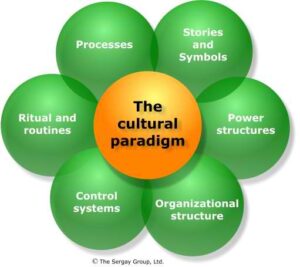Characteristics of a Successful Culture
What are the elements of a successful culture at any given company (startup or multi-billion multi-national)? How important do you think the amenities play into the corporate culture?
- Murals/artwork on the walls
- Bicycle, scooter, surfboard racks
- Dogs (dog-friendly)
- Lava lamps
- Massage chairs
- Large inflatable balls
- Cube sharing
- Company-supported laptops/ipads everywhere
- Standard phone issue for mobile coding, email on the go and note-taking
- Foosball, pool tables, volleyball courts, assorted video games, pianos, ping pong tables, and gyms that offer yoga and dance classes
- Employee groups for all interests, like meditation, film, wine tasting and salsa dancing
- Healthy lunches and dinners for all staff at a variety of cafés
- Break rooms packed with a variety of snacks and drinks to keep people going
How do you define the overall “social assertiveness” of the organization? For example,
- Do people at your organization frequently use sports metaphors (especially high-contact sport metaphors taken from football, hockey, etc.) in describing business situations?
- Does your organization have a reputation for being aggressive in its approach generally and for attracting individuals with an aggressive style?
- How much is success in your organization a function of the size (and composition) of your “network” of people?
- What is the ratio of work-done-with-others to work-done-alone?
- How much does “pushing” for things account for success?
- How much business entertaining goes on?
- How much time is spent analyzing and thinking vs. discussing and persuading?
- How much is success dependent on professional expertise?
It really comes down to each and every individual you add to the team, right? So do you want to build a company of Googlers or Applers? How do you hire…what characteristics of the team are you trying to cultivate? Here’s a potential list from A-Z (well, actually A-W). What on this list do you think is important? What’s missing?
- Ability to Compromise: able to compromise when the situation calls for it.
- Action-orientation: action-oriented: makes sure that decisions are implemented.
- Assertiveness: able to defend a point of view and to confront others appropriately when necessary.
- Comfort with Differences: comfortable and effective in relating to people from many different backgrounds and cultures.
- Comfort with Risk: takes risks when appropriate, isn’t afraid to innovate and experiment.
- Conflict Tolerance: able to be effective in an environment where strong and opposing views are being expressed.
- Creative Thinking: able to think creatively, generating new ideas and approaches to situations.
- Critical Thinking: able to think critically (define a problem and determine the information needed to solve it; understand unspoken assumptions; form and test hypotheses; and judge the validity of conclusions).
- Decisiveness: able to make decisions even in ambiguous situations and without full information.
- Empathy Skills: can see things from other people’s points of view.
- Flexibility: adapts easily to changing situations and is able to adopt new approaches when necessary.
- Gaining Trust: inspires other people’s trust.
- Influence: can influence and persuade other people, even without direct authority.
- Leadership: comfortable taking a leadership role.
- Listening Skills: listens to other people in a way that they feel understood.
- Merit-orientation: judges ideas and people on merit alone, without bias or favoritism.
- Motivational Ability: understands how to motivate different kinds of people to do their best work.
- Multiple-focus: able to juggle many projects and responsibilities at once.
- Openness to Criticism: accepts critical feedback without becoming defensive.
- Organizational Priority: able to make decisions that are in the best interest of the organization, even though they cause individual people distress.
- Persistence: doesn’t get discouraged and give up on things easily.
- Political Skill: knows how to get things done within the political framework of an organization.
- Power-orientation: comfortable asserting authority and using power.
- Projection of Confidence: projects self-confidence, even in uncertain and difficult situations.
- Quantitative Analysis: skillful in using quantitative analysis to understand business issues.
- Quick Thinking: picks up new ideas and processes new information quickly and easily.
- Recognition of Opportunity: recognizes new opportunities and acts to take advantage of them.
- Resilience: handles pressure and stress well.
- Respect for Others: respectful of other people’s points of view, as well as their time and priorities.
- Sensitivity and Tact: sensitive and tacful: promotes an atmosphere of good feeling and mutual consideration.
- Sociability: socially venturesome and self-assured; forms new relationships easily and works to maintain them.
- Strategic Thinking: a strategic thinker: able to grasp the big picture and think long-term.
- Teamwork: a team player: cooperative, works well as part of a group.
- Work Ethic: has a strong work ethic, willing to make sacrifices to achieve important goals.
Do many successful organizational cultures value outgoing, assertive, and sociable individuals? In companies, departments, and teams like these, “pushing” an agenda to get things done (but not to dominate someone else) is seen as a good thing. People who thrive in these cultures view meetings, discussions, debates, and negotiations not as distractions from the “real” work but rather, as the work. And they have no qualms about making a little noise in order to get their ideas heard.
Give Me An Example
When I need a break, I sometimes like to search around various startup companies, studying how they present themselves….how they reflect their internal culture. Many fail miserably to either define their culture, or communicate it.
I personally link the company brand and culture together because, frankly, your brand should reflect your culture….and visa versa. Take a company I ran across this week, Braintree. It’s an online business (startup), which processes credit card payments. Talk about a perceived crowded space with paypal, money bookers, Intuit, Google Checkout, First Data, Authorize.net, Amazon Payments, Alert Pay, 2 Check Out, and Plimus….to mention a few…whether we’re talking about payment gateway processing or merchant account services…this is a space that probably needs a scrappy startup to come in and disrupt!
From my perspective Braintree does something their competitors fail to do….it defines itself not by the features and functions that is creates which differentiate itself from its competitors, but defines itself by the company’s people and the “social behavior, beliefs, thoughts” of the organization.
Remember the “do no evil” slogan that Larry and Sergey used as the informal motto of Google? Well, Braintree uses “Be good, do good.”
If you’re too lazy to click through, here’s their recent attempt to capture the essence of their culture:
The Braintree Compass
- Be good, do good.
- Help others succeed and celebrate their accomplishments.
- Find reasons to be grateful and express it frequently.
- Inspire others by being your best.
- Be quick to empathize and slow to criticize.
The Braintree work ethos
- Don’t be a monkey. Question everything; don’t rely on assumptions.
- Use Pareto to aim for the 80 and Parkinson to avoid time traps.
- Swim in solutions, not problems.
- There has got to be a better way, let’s figure it out.
- Provide immediate, honest, and tactful feedback. Let nothing linger.
What we value in each other
- Self management: both hands firmly gripped on the steering wheel.
- Ownership: I’ve got it, you don’t need to think about it.
- Initiative: getting things done without the slightest nudge.
- Virtue: honesty, humility, thoughtfulness, kindness, and appreciation.
- Problem solving: nothing that can’t be solved and improved.
- Team work: we before I.
To be honest, if I didn’t live in the Valley (and lived in Chicago IL), I’d want to work with these guys…wouldn’t you? OK, even if you didn’t like credit card payment processing, you’d definitely want to pick their brains (no pun intended).
“Don’t be a monkey”, define your company culture.





One thought on “Characteristics of a Successful Culture”
Comments are closed.